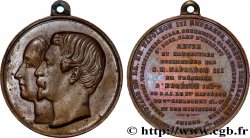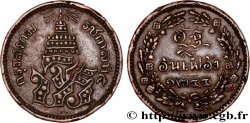fme_479054 - SECOND EMPIRE Médaille, Centenaire de l’empereur Napoléon Ier
120.00 €
Количество
Добавить в корзину

Тип Médaille, Centenaire de l’empereur Napoléon Ier
Дата: 1869
Монетный двор / Город: 75 - Paris
Металл: gilt bronze
Диаметр: 50,5 mm
Ориентация осей монеты: 12 h.
Вес: 52,24 g.
Век: lisse
Комментарии о состоянии
Bel exemplaire présentant un léger nettoyage dans les champs. Patine hétérogène
Ссылки в каталоге: :
Лицевая сторона
Аверс: легенда: SOUVENIR DU CENTENAIRE DE L’EMPEREUR NAPOLEON I // *1769=1869*.
Аверс: описание: Tête laurée de Napoléon Ier à droite.
Обратная сторона
Реверс: легенда: ANÉPIGRAPHE.
Реверс: Описание: Code Napoléon, posé un un coussin avec une légion d’honneur, un sabre et un chapeau bicorne, entre une branche de laurier et une branche de chêne ; au-dessus un aigle couronné tenant un foudre et une branche dans ses serres.
Комментарий
Tranche lisse, sans aucun poinçon.
Cette médaille est intéressante, représentant un résumé des symboles de ce que laissa Napoléon Ier.
- Le Code civil des Français, appelé usuellement « Code civil » (souvent abrégé en « C. Civ. » ou « CC ») ou « Code Napoléon », regroupe les lois relatives au droit civil français, c’est-à-dire l'ensemble des règles qui déterminent le statut des personnes (livre Ier), celui des biens (livre II) et celui des relations entre les personnes privées (livres III et IV).
- L’ordre national de la Légion d’honneur est l'institution qui, sous l'égide du grand chancelier et du grand maître, est chargée de décerner la plus haute décoration honorifique française. Elle a été instituée le 19 mai 1802 par Napoléon Bonaparte. Elle récompense depuis ses origines les militaires comme les civils ayant rendu des « mérites éminents » à la Nation.
En 2016, il existe 92 000 récipiendaires toujours vivants à comparer auprès d’un million de personnes qui a reçu cette décoration depuis sa création.
Smooth edge, without any hallmark. This medal is interesting, representing a summary of the symbols of what Napoleon I left behind. - The French Civil Code, usually called the \\\"Civil Code\\\" (often abbreviated to \\\"C. Civ.\\\" or \\\"CC\\\") or \\\"Napoleonic Code\\\", brings together the laws relating to French civil law, that is to say the set of rules that determine the status of persons (Book I), that of property (Book II) and that of relations between private persons (Books III and IV). - The National Order of the Legion of Honor is the institution which, under the aegis of the Grand Chancellor and the Grand Master, is responsible for awarding the highest French honorary decoration. It was established on May 19, 1802 by Napoleon Bonaparte. Since its origins, it has rewarded both military personnel and civilians who have rendered \\\"eminent merits\\\" to the Nation. As of 2016, there are 92,000 living recipients compared to the one million people who have received this decoration since its inception.
Cette médaille est intéressante, représentant un résumé des symboles de ce que laissa Napoléon Ier.
- Le Code civil des Français, appelé usuellement « Code civil » (souvent abrégé en « C. Civ. » ou « CC ») ou « Code Napoléon », regroupe les lois relatives au droit civil français, c’est-à-dire l'ensemble des règles qui déterminent le statut des personnes (livre Ier), celui des biens (livre II) et celui des relations entre les personnes privées (livres III et IV).
- L’ordre national de la Légion d’honneur est l'institution qui, sous l'égide du grand chancelier et du grand maître, est chargée de décerner la plus haute décoration honorifique française. Elle a été instituée le 19 mai 1802 par Napoléon Bonaparte. Elle récompense depuis ses origines les militaires comme les civils ayant rendu des « mérites éminents » à la Nation.
En 2016, il existe 92 000 récipiendaires toujours vivants à comparer auprès d’un million de personnes qui a reçu cette décoration depuis sa création.
Smooth edge, without any hallmark. This medal is interesting, representing a summary of the symbols of what Napoleon I left behind. - The French Civil Code, usually called the \\\"Civil Code\\\" (often abbreviated to \\\"C. Civ.\\\" or \\\"CC\\\") or \\\"Napoleonic Code\\\", brings together the laws relating to French civil law, that is to say the set of rules that determine the status of persons (Book I), that of property (Book II) and that of relations between private persons (Books III and IV). - The National Order of the Legion of Honor is the institution which, under the aegis of the Grand Chancellor and the Grand Master, is responsible for awarding the highest French honorary decoration. It was established on May 19, 1802 by Napoleon Bonaparte. Since its origins, it has rewarded both military personnel and civilians who have rendered \\\"eminent merits\\\" to the Nation. As of 2016, there are 92,000 living recipients compared to the one million people who have received this decoration since its inception.








 Cообщить об ошибке
Cообщить об ошибке Распечатать страницу
Распечатать страницу Отправить мой выбор
Отправить мой выбор Задать вопрос
Задать вопрос Consign / sell
Consign / sell
 Информация
Информация











